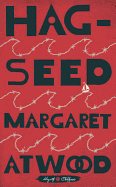
It's easy to sympathize with Felix Phillips, the Prospero figure in Hag-Seed, Margaret Atwood's clever version of The Tempest, the latest in the Hogarth series of Shakespeare works reimagined by acclaimed novelists. In 2001, he's the celebrated avant-garde artistic director of Canada's Makeshiweg Theatre Festival, but life is far from perfect. His wife died in childbirth three years earlier, and now his daughter, Miranda, has died from meningitis. One can understand, therefore, why he doesn't care if audiences are baffled by his decision to stage Pericles with extraterrestrials. Then, another cruel blow: his "Machiavellian foot-licker" subordinate gets the festival board to oust him before he can stage his dream version of The Tempest, and Felix drops out of society and is reduced to applying adhesive to his dentures in his abandoned hillside shack.
Several years later, he sees his chance for redemption: he becomes a literacy skills teacher at the Fletcher County Correctional Institute. Rather than follow the syllabus, Felix stages one Shakespeare play a year with inmates as cast members. In 2013, he uses The Tempest as a means to get revenge on his usurpers, two of whom are now government officials running for higher office. Atwood (Stone Mattress) has great fun creating parallels between the tale of Caliban and Ariel and the life of inmates with nicknames like Bent Pencil and SnakeEye. And what's not to enjoy about a novel in which prisoners can use only Shakespearean swears, a limitation that leads to such lines as, "What the pied ninny is this?" --Michael Magras, freelance book reviewer

